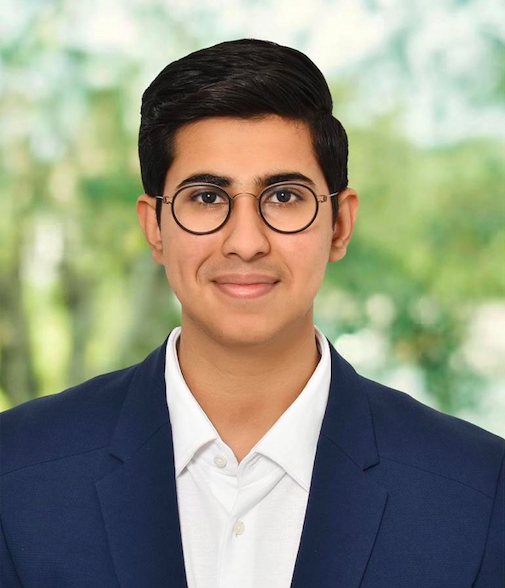Your Future as an ESG Pioneer


These days harnessing the power of business to make the world a better place is defined by three letters: ESG. The Environmental, Social and Governance movement demands commercial and creative thinkers of all kinds, who are helping to reshape corporate priorities, design innovative new products, and drive policy changes – in a variety of industries.
What does that work look like? Wharton Global Youth caught up with a few undergrads at the Wharton School of the University of Pennsylvania, who are laying the foundation for careers as ESG business changemakers.
Internships and Innovation
 For Sapphira C., ESG represents all the positive areas of impact that the world of business can support. The senior at the Wharton School of the University of Pennsylvania has spent her years as a college undergrad exploring ESG, as she works toward a degree combining finance, entrepreneurship and public policy.
For Sapphira C., ESG represents all the positive areas of impact that the world of business can support. The senior at the Wharton School of the University of Pennsylvania has spent her years as a college undergrad exploring ESG, as she works toward a degree combining finance, entrepreneurship and public policy.
A former summer intern at Point72, Soros Fund Management, and MSCI, Sapphira was accepted as a year-long Turner ESG Fellow through the Wharton ESG Initiative for her junior year. She is currently an inaugural Senior Fellow at the Wharton ESG Initiative. “The beautiful thing about working for these companies is that they’re all leaders in ESG finance,” says Sapphira, who is especially passionate about impact investing that builds wealth, while also helping society and the environment. “As someone who came in kind of idealistic about using business for impact, my experiences over the past few summers have made me even more confident that investing and finance can truly support positive ESG impact.”
Along the way, Sapphira founded the Penn Innovation Network, an ESG innovation club. “The intersection of ESG and innovation applies to virtually any industry,” notes Sapphira, who is also an NCAA Division I student-athlete on the Penn Varsity Fencing Team. “We need innovation and creative thinking to address ESG, because the area is constantly changing.” Through all this work, she has identified important ESG trends that require a change in process and mindset: finding ways to measure the impact of environmental, social and governance work; and improved transparency from companies about the ways they are regularly supporting ESG.
💡 An ESG insight that Sapphira wants to pay forward? Climate Hypocrisy Risk.
“This is when companies are putting up a façade of taking climate into account, while actively engaging in non-ESG-compliant behavior,” says Sapphira, adding that it’s a branch of greenwashing. “During the pandemic I learned about ghost flights, empty airplanes that were flown and landed around Europe by multiple airlines to secure route usage and gate allocations. I feel it’s extremely hypocritical for airlines to say they’re ESG-friendly and then turn around and do something like this. It’s a prime example of climate hypocrisy risk.”
Sustainable Economic Models
 When Muhammad V. was in high school in Dubai, he wrote a research paper on the Central Bank of UAE’s monetary policy during the COVID-19 crisis. When he was accepted to the Wharton School, finance was an obvious course of study — with a twist. He believed deeply in sustainable business practices. “During my research on the UAE Central Bank, I delved deep into the dynamics of a region heavily dependent on non-renewable resources (oil!). The research highlighted that transitioning away from such dependence is a complex process that cannot be expedited easily,” says Muhammad, who has added Business, Energy, Environment, and Sustainability within Wharton’s ESG concentration to his studies. “It requires careful planning and strategic shifts in economic models.”
When Muhammad V. was in high school in Dubai, he wrote a research paper on the Central Bank of UAE’s monetary policy during the COVID-19 crisis. When he was accepted to the Wharton School, finance was an obvious course of study — with a twist. He believed deeply in sustainable business practices. “During my research on the UAE Central Bank, I delved deep into the dynamics of a region heavily dependent on non-renewable resources (oil!). The research highlighted that transitioning away from such dependence is a complex process that cannot be expedited easily,” says Muhammad, who has added Business, Energy, Environment, and Sustainability within Wharton’s ESG concentration to his studies. “It requires careful planning and strategic shifts in economic models.”
Muhammad is excited to witness the evolution of ESG from a buzzword to actual corporate policy and believes he can help organizations align their goals with broader social and environmental objectives. While working in M&A in Dubai during the summer, he discovered geographical differences in the receptiveness to ESG principles. Laws and regulations, he concluded, will drive positive change in the business landscape.
“ESG is a fundamental shift in how businesses operate and contribute to society,” notes Muhammad, who points to KKR’s new employee ownership model as one example of a firm’s focus on social well-being. “It’s about a new way of thinking, problem-solving, and policymaking. Companies that embrace ESG principles are not only contributing to a better world but are also positioning themselves to be more competitive in the long run. They’re better equipped to navigate risks, attract top talent, and meet the expectations of an increasingly conscious consumer base.”
💡 An ESG insight that Muhammad wants to pay forward? Venture capitalist, Chamath Palihapitiya. “His prediction that the next trillionaire would emerge from climate change-related ventures further fueled my interest in ESG,” says Muhammad. “It highlighted the growing significance of environmental and social impact in the business world.”
Community Health Care
 The health of a population is fast becoming a business priority – and therein lies the intersection of health care and ESG.
The health of a population is fast becoming a business priority – and therein lies the intersection of health care and ESG.
As a student at the Roy and Diana Vagelos Program in Life Sciences and Management, Amy W. is jointly pursuing a degree in neuroscience at the University of Pennsylvania’s College of Arts and Sciences and a Wharton School degree in economics with a concentration in health care management. “I am a premedical student and very passionate about health care, especially combating neurodegenerative conditions and increasing health care access for older adults,” says Amy, who graduated from Hershey High School in Pennsylvania, U.S. “Volunteering in nursing homes has allowed me to see the challenges that this population faces…working directly with those in the community has taught me so much and I hope to continue learning about how to affect positive change in health care.”
Ultimately, Amy hopes to become a doctor and apply her business education to pushing for initiatives that give older adults better access to health care. She is focused on making a difference through medicine. “Go out in your community and see what is happening,” she advises. “Read up on the issues of the day. Write your legislators about what matters to you and your community…Always strive to make an impact.”
💡 ESG insights that Amy wants to pay forward? Neurodegeneration and Regeneron. “I’ve conducted research on alpha synuclein, a protein implicated in neurodegeneration, in the Rhoades Lab at Penn. I have also worked in clinical trial management at Regeneron,” she notes. “My time at the Rhoades Lab focused on unravelling pathologies behind neurodegeneration, which will contribute to the body of knowledge that will hopefully one day inform a cure. At Regeneron, I focused on novel therapeutics that will advance patient health. Both of my experiences were meaningful to me because of how focused they were on making a positive impact for patients and their families.”
Conversation Starters
Which of these student profiles interests you the most and why? Have you researched, studied and/or interned in the area of ESG? Share your story in the comment section of this article.
Muhammad V. believes that ESG-informed laws and regulation will drive positive change in the business landscape. Why is that so important for the ESG movement?
Much like Amy W. aspires to be a socially aware and active doctor, ESG principles can be applied to so many professional and business environments. Which industries and commercial settings do you feel might benefit most from the ESG mindset?
Hero Image Photo Credit: Karsten Wurth
Thank you, Diana Drake, for this insightful article on the burgeoning field of ESG and the inspiring journeys of Sapphira, Muhammad, and Amy. Their stories highlight the transformative potential of ESG principles across various industries and the importance of integrating these values into our professional and personal lives.
The student profile that resonates with me the most is Amy W.’s. Her dedication to combining neuroscience, healthcare management, and a passion for improving healthcare access for older adults is truly commendable. Amy’s work in neurodegeneration research and clinical trial management at Regeneron exemplifies how ESG principles can be applied to healthcare to drive meaningful change. Her advice to engage with the community and advocate for important issues underscores the vital role of grassroots activism in fostering a more equitable and sustainable world.
Muhammad V.’s insights on the necessity of ESG-informed laws and regulations are also compelling. As he notes, legislative frameworks can significantly influence corporate behavior and ensure that businesses prioritize sustainability and social responsibility. This regulatory approach is crucial for embedding ESG principles into the fabric of business operations, ultimately leading to more resilient and forward-thinking companies.
The emphasis on combating climate hypocrisy, as highlighted by Sapphira, is another critical aspect of the ESG movement. It reminds us that genuine commitment to ESG values requires transparency and accountability. Companies must move beyond mere greenwashing and take concrete actions to reduce their environmental footprint and enhance social governance.
In terms of industries that could benefit most from the ESG mindset, I believe the energy sector, technology, and finance are pivotal. The energy sector, in particular, has a significant impact on the environment, and adopting ESG principles can drive the transition towards renewable energy and sustainable practices. The technology industry, with its rapid innovation cycles, can leverage ESG to develop solutions that address global challenges, such as climate change and social inequality. Lastly, the finance sector, by integrating ESG criteria into investment decisions, can allocate capital towards projects that generate positive social and environmental outcomes.
Overall, this article reinforces the importance of ESG in shaping a better future and inspires us to think creatively and act responsibly in our respective fields. Thank you for shedding light on these remarkable student leaders and their contributions to the ESG movement.
Sapphira’s profile was very interesting, and the way she stressed the fact that finance can support ESG and our need for corporate transparency, creative thinking, and innovation in a constantly changing business term, as well as her preoccupation with climate hypocrisy risk was essential and novel. However, the profile that interested me the most was Muhammad’s. It is very interesting how his research project on the Central Bank of UAE’s monetary policy and the risks of Dubai being a region heavily dependent on non-renewable sources, sparked his interest in an ESG concentration in his business studies. I completely agree with Muhammad that there needs to be a shift in our economic models. What are shareholders demanding from companies? Are they asking for ESG analyses? Are the laws demanding it? What products are the most valued by consumers? And of course, it is exciting to think of a future where the term ESG not only lives in the mouths of those concerned with business ethics, but it is amusing to think of a future in which it could become a corporate policy.
I get where Muhammad is coming from when he says that laws and regulations are extremely important for the implementation of ESG in the business landscape. Only laws will force companies to not only worry about making profits but to pay attention to how they can leave a positive impact on the environment, and address social issues. ESG is a crucial shift in how businesses should be operating and contributing to society. We need new ways of thinking, finding solutions to our current problems, and a different way of policy-making. It was interesting and surprising to realize that companies with an ESG focus are not only helping change the world but are also making themselves more competitive and well-prepared in the long term. This is often something we dismiss to contemplate when thinking about the benefits of ESG. We often contemplate the fact that it will be good for our environment and society, even if it costs companies to reduce their profits. But it is refreshing to realize that as companies begin to have environmental and social objectives, they are becoming better equipped to navigate failures or difficulties, attract professionals with the same focus and great ideas, and meet the expectations of an increasing number of shareholders and consumers that are becoming concerned with these topics, so it will not necessarily mean a reduction in profits, but an adaptation for our future.
I find some similarities in myself compared to Muhammad in that his purpose is to help organizations merge their goals and align them with social and environmental goals, and how his interest in ESG was fueled by Chamath Palihapitiya’s prediction that the next trillionaire would come from environmental ventures. In my case, as I have become more aware of the importance of ESG implementation in companies, I became inspired and realized that if there was a company that helped businesses do this transition and guided them to get the tools and resources that are necessary for this, with a focus on the food industry, then many more businesses would join this movement with ease and less fear on where to begin. Currently, I am cultivating my idea of how to start this project and get it running. The Wharton Global Youth’s articles on environmental leaders and business knowledge have sparked my interest in ESG helping me investigate and analyze many articles on business ethics and ESG in investing.
Amy W.’s goal is very interesting too. As a neuroscience and economics student with a focus on health care and management, her time volunteering helped her to find a problem that her community was facing and work to create an impact and solve that problem. Amy wants to become a doctor and use her business knowledge to impulse initiatives that strive to give older adults better access to health care. With her profile, I realize that ESG cannot only be applied in finance or business but in a great variety of fields. Aside from the healthcare industry, I believe that the food industry would benefit the most from an ESG mindset, as many processes of the food industry today, such as meat and palm oil production are harmful to our environment and our society’s health. Another industry would be the technological, and AI emerging industry, as nowadays there are many concerns on the benefits and downsides of AI, how it could make us less autonomic, and creative, and replace human jobs, I believe an ESG mindset would be extremely helpful in this industry to find ways in which technologies such as AI can actually work to benefit us and help our societies flourish.
Thanks for sharing your ideas, Isabella! I like how you pointed out Sapphira’s take on ESG and the need for transparency and innovation. Her concern about climate hypocrisy is definitely a big deal.
But I get why you were more interested in Muhammad’s story. His research on the Central Bank of UAE’s policies and Dubai’s reliance on non-renewable resources really highlights the need for a shift to sustainable economic models. You’re totally right about laws and regulations being crucial for making companies focus on more than just profits. The COP28 in Dubai last November made headlines with 84,000 attendees! I actually covered this on one of my podcast episodes. Representatives from major oil and gas corporations such as Shell, Chevron, TotalEnergies, and BP attended, sparking discussions on their role in the climate dialogue. While I think including these companies will bring a meaningful change, the challenge now is ensuring that the commitments declared at the event materialize into meaningful actions and bring about lasting change.
I also love your take on how ESG can make companies more competitive. It’s refreshing to hear that it’s not just about doing good for the environment and society, but also about making businesses stronger and more attractive to talent and consumers. ESG has its crucial roles in valuation, competition, and regulation. It’s exciting to think about a future where ESG is a core part of corporate policy.
Your idea to help companies transition to ESG practices, especially in the food industry, sounds amazing. The food industry has such a huge impact on the environment and health with so much food waste, and it could really benefit from sustainable practices.
For me, ESG-informed laws and regulations are essential because they ensure companies prioritize sustainability and social responsibility alongside profits. Many companies are under the notion that achieving fiscal gain is impossible because of ESG hindrance. However, I think both can be prioritized. This shift is crucial for long-term positive impact. As a Texas resident, I also want to mention how the Texas Education Fund recently pulled its investment from BlackRock due to concerns that BlackRock’s ESG policies were too influential on their investment decisions. This decision directly affects me and highlights the tension between local economic interests, especially in my school district, and global sustainability goals. It’s a reminder of how interconnected and impactful these decisions can be on our communities and that we are much closer to the problem than we think.
Your proactive approach and commitment to making a difference are really inspiring. In my own journey, I’ve been using my podcast, “Sustainable Cents,” to inspire my local community. Through my podcast, I discuss money markets and environmental topics, breaking down complex ideas into easy-to-understand episodes. It’s been amazing to see how sharing knowledge and sparking conversations can drive interest and action towards a sustainable future.
Can’t wait to see how your project develops!
This article is inspiring and shows how young business leaders are making a big impact through ESG. The stories of students at the Wharton School, demonstrate their strong commitment to sustainability and social responsibility.
Sapphira is working on impact investing and fighting “climate hypocrisy risk.” She founded the Penn Innovation Network and interned at top ESG finance firms, showing how young people can mix idealism with real world experience to create positive change.
Muhammad focuses on sustainable business models and the challenges of moving away from non-renewable resources. His experience in mergers and acquisitions and his belief in the long-term benefits of ESG principles highlight how socially responsible businesses can be more competitive.
Amy is passionate about healthcare, especially for older adults and neurodegenerative diseases. Her volunteer work in nursing homes and research at the Rhoades Lab and Regeneron show how business skills can improve community health.
This article makes me hopeful for the future of business. It proves that making money and doing good for society can go hand in hand. The dedication and innovative ideas of these students suggest a bright future where businesses succeed financially and contribute positively to society and the environment.
Amongst the variety of ways to make companies become more adaptive to new challenges, I agree with Muhammad’s view of carefully framing economic policies to redefine the dynamic of supply and demand. For example, governments will be the primary driving force to break the protectionism and implement ESG changes in a corporate setting. On its own, fossil fuels, like oil and gas, are relatively endless. However, as technology improves, new ways of refining crude oil and new natural resources become economically viable as fuels. This puts pressure on policy makers and companies themselves to encourage the use of renewable resources.
While ESG principle policies have been applied in many industries, the auto/transportation industry is one of the most lucrative industries to implement the greatest change. Unlike other sectors, there has already been an active disincentive for fossil fuel based cars, and active ongoing policies to encourage the purchase of electric vehicles (EVs). This incentive, in the form of a subsidy for purchasing an EV, is essential to increasing the economic viability of EVs on the road. We estimate that cheaper maintenance and upfront cost will give consumers an economic and sustainable reason to switch from traditional cars to an EV. Policies that are directed at the auto and transportation sector, can eliminate almost 28% of total emissions in the US.
Through multiple research exercises I conducted over the summer at Harvard, it was concluded that despite the economic attractiveness for EVs, additional economic policies targeted at encouraging the usage of EVs instead of the purchase of EVs, could help build a more environmentally friendly industry. Policies have to mainly target the lower income class. Most families who drive older and less efficient combustion vehicles, are causing greater emissions compared to the owner of EV. Even with a cheaper price tag, lower income class families are hesitated and still unpersuaded. And they represent the largest portion of car ownership, thus contributing the most to car emission. We surveyed hundreds of car owners and found the major reasons for discouraging lower income class families to own EVs are: the lack of charging stations in their communities, and the cost of charging EV. The suggestion for policymakers is to slate and implement economic policies to make driving an EV more feasible for lower income class communities, thus targeting the majority of the market share driving the most polluting vehicles.